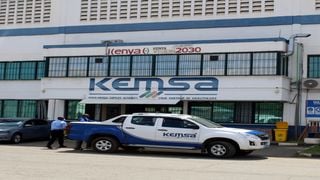
The Kenya Medical Supplies Authority (Kemsa) offices in Nairobi.
| Lucy Wanjiru | Nation Media GroupFinance and Markets
Premium
The curious shortage of Kemsa millionaire tenderpreneurs
What you need to know:
- Fewer and fewer firms are bidding for tenders advertised by the agency.
- No one wants to attract the attention of anti-corruption agency.
There is a curious shortage of suppliers who want to become millionaires by doing business with the Kenya Medical Supplies Agency (Kemsa).
Fewer and fewer firms are bidding for tenders advertised by the agency, with others demanding upfront cash payment to do business with the State corporation.
Investigations into the Sh7.8 billion Covid-19 Kemsa millionaires’ scandal are still ongoing, and it appears not many want to risk attracting the attention of the anti-graft agencies.
An analysis of the latest data on the government procurement portal shows that the list of bidders for Kemsa tenders so far published is getting shorter and shorter. There are cases where only one firm applied for a tender.
Kemsa also appears to be floating fewer contracts this year, following the scandal that hit the agency last year, which put its procurement processes on national spotlight.
The tenders’ portal shows that, so far, Kemsa has handed out contracts worth Sh795.3 million this year, compared to the Sh10.6 billion last year. Last year, when the Covid-19 millionaires’ scandal came to public limelight, the company signed 306 contracts with suppliers.
Between January to date, the organisation has posted 53 tenders and has signed 25 contracts. But despite saying it has signed 53 tenders, only about one dozen have been posted on the Public Procurement Information Portal (PIIP).
Covid millionaires’ scandal
The tenderpreneurs flight appears to have spread to even non-Covid 19 tenders. For instance, only one company applied for a tender to supply TB medicines.
Despite bowing to pressure to start listing the tenders on the portal, Kemsa is yet to fully update the site with all the contracts, its beneficiaries and tender values. Also missing is details of who the bidders were, despite having awarded the contracts.
For instance, a tender to procure PCR Machines (ABI QuantStudio 5) under the Kenya emergency response project did not give a list of the bidders. It, however, only names Africa Biosystems Limited as the winner on grounds that it had the highest technical and financial scores.
Without knowing who the other bidders were, if any, and how much their bid price was, the information provided is insufficient for members of the public to independently verify its details, which is the main reason why President Uhuru Kenyatta directed procurement agencies to publish all tender contestants.
The procurement portal is difficult to navigate, and some of the critical searchable characteristics are missing, making scrutiny of the tenders laborious.
At the height of the Covid millionaires’ scandal, tenderpreneurs said in their own testimonies to Parliament that they would just walk to the company's head office on commercial street, only to walk out with multi-million-shilling contracts without breaking a sweat.
Several requirements
The slow-down also appears to be a reaction to the push by the government to clean up the mess at the medical supplies agency, by enforcing an anti-corruption policy, which requires bidders to sign commitments that they will not be involved in any bribery or corrupt practices in the tendering process.
A copy of the undertaking on the tender’s website says the government of Kenya is committed to fighting corruption in all its forms and in all its institutions to ensure that all the taxpayers’ revenues are utilised prudently.
“Here at Kemsa, and also being one of the government entities mandated under the government legal notice number 466 of 2004 to procure, warehouse and distribute essential medicines… we are highly committed to fighting any form of corruption in our organisation,” Kemsa says in the undertaking notice.
It then goes ahead to list several requirements that bidders wishing to do business with Kemsa must comply with.
To apply for contracts, each bidder must now submit a statement and sign non-bribery commitments from themselves and their sub-contractors and consortium of partners.
The bidder may also cover the sub-contractors and consortium in its own statement, provided the bidder assumes full responsibility.
Successful bidder
“Each bidder will make full disclosure in the tender documentation of the beneficiaries amounts of all payments made, or intended to be made, to agents or other third parties (including political parties or electoral candidates) relating to the tender and, if successful, the implementation of the contract,” Kemsa says in a notice to bidders.
The successful bidder will also be required to make full disclosure (quarterly or semi-annually) of all payments to agents and other third parties during the execution of the contract.
In addition, within six months of the completion of the performance of the contract, the successful bidder will formally certify that no bribes or other illicit commissions have been paid.
A number of companies are now demanding upfront cash payment from firms doing business with Kemsa and other government agencies after their money was stuck in the drugs agency, having been caught up in the scandal investigations.
Kemsa is unable to pay billions of shillings owed to some in inflated bills due to lack of a budget, and also being unable to find buyers of its stocks.
The Ethics and Anti-Corruption Commission (EACC) froze all the payments to the companies, to stop further taxpayer losses. EACC boss, Twalib Mbaraka, said its detectives helped to stop another Sh9 billion that was to be paid out.
EACC says the caveat to stop payments is still on, which means that the companies will have to wait a little longer to get their money.





